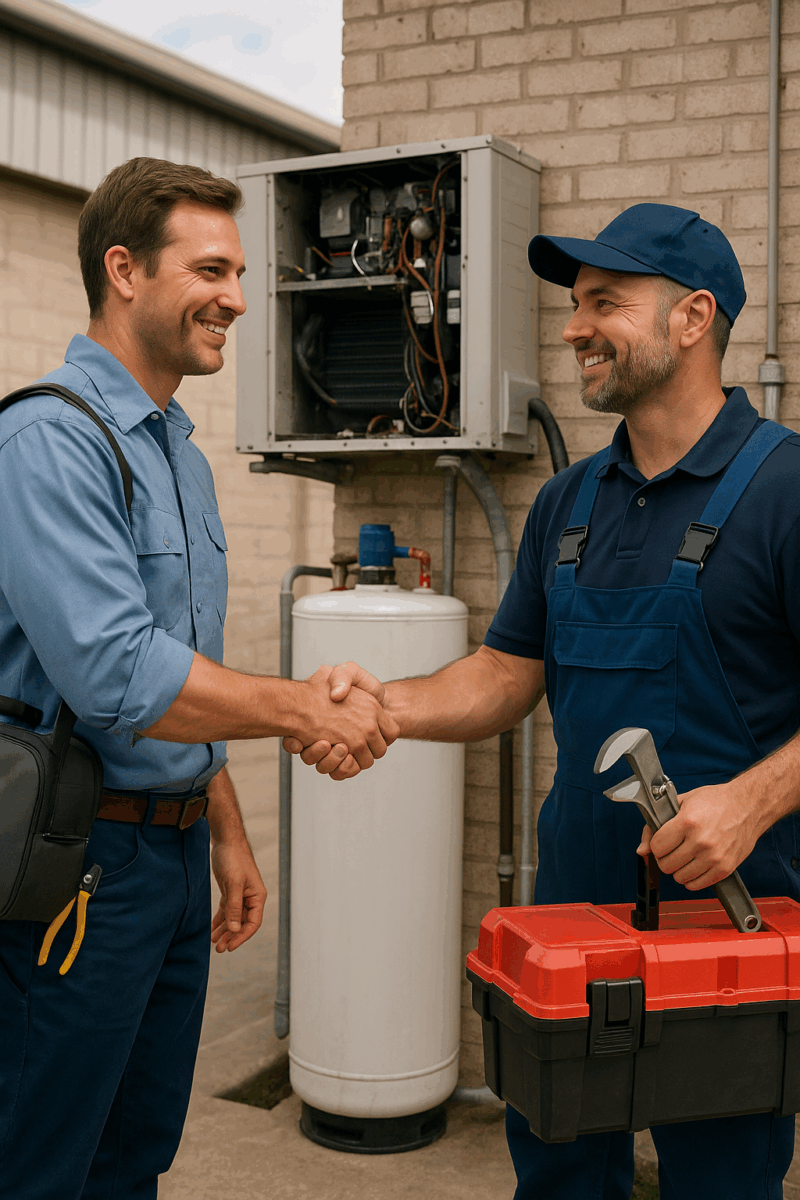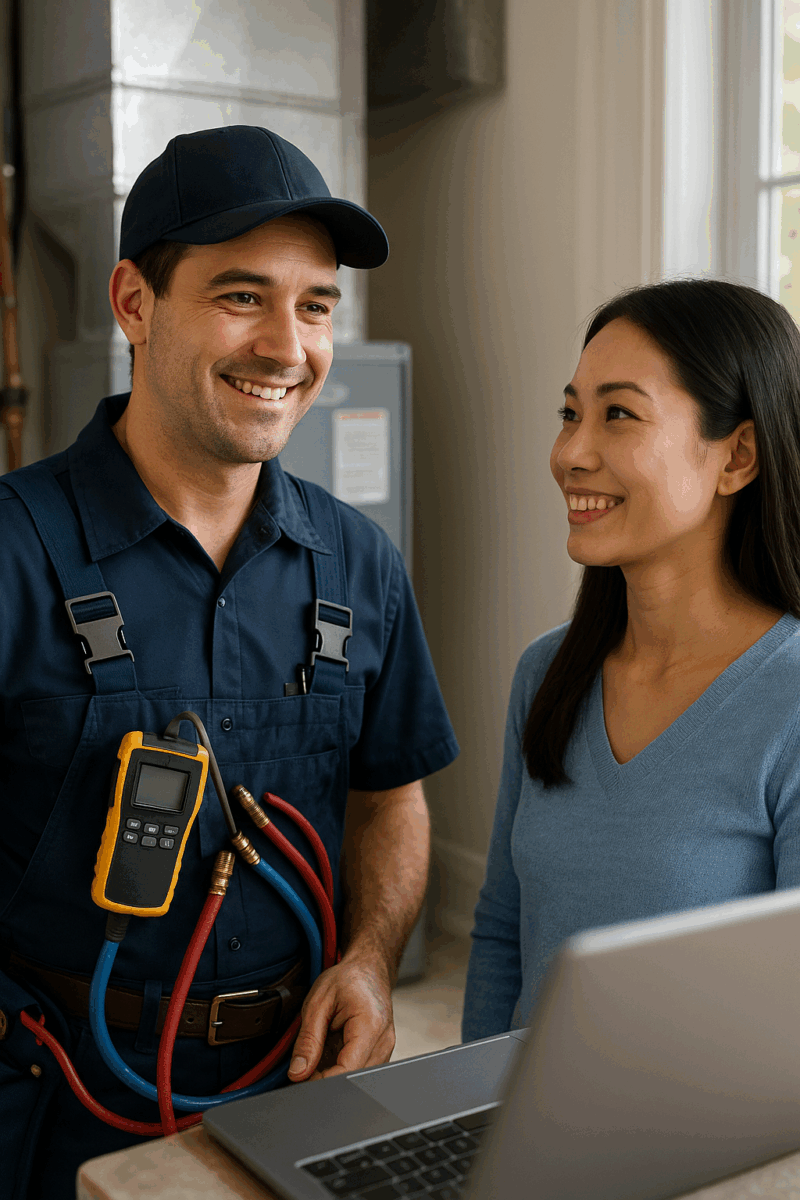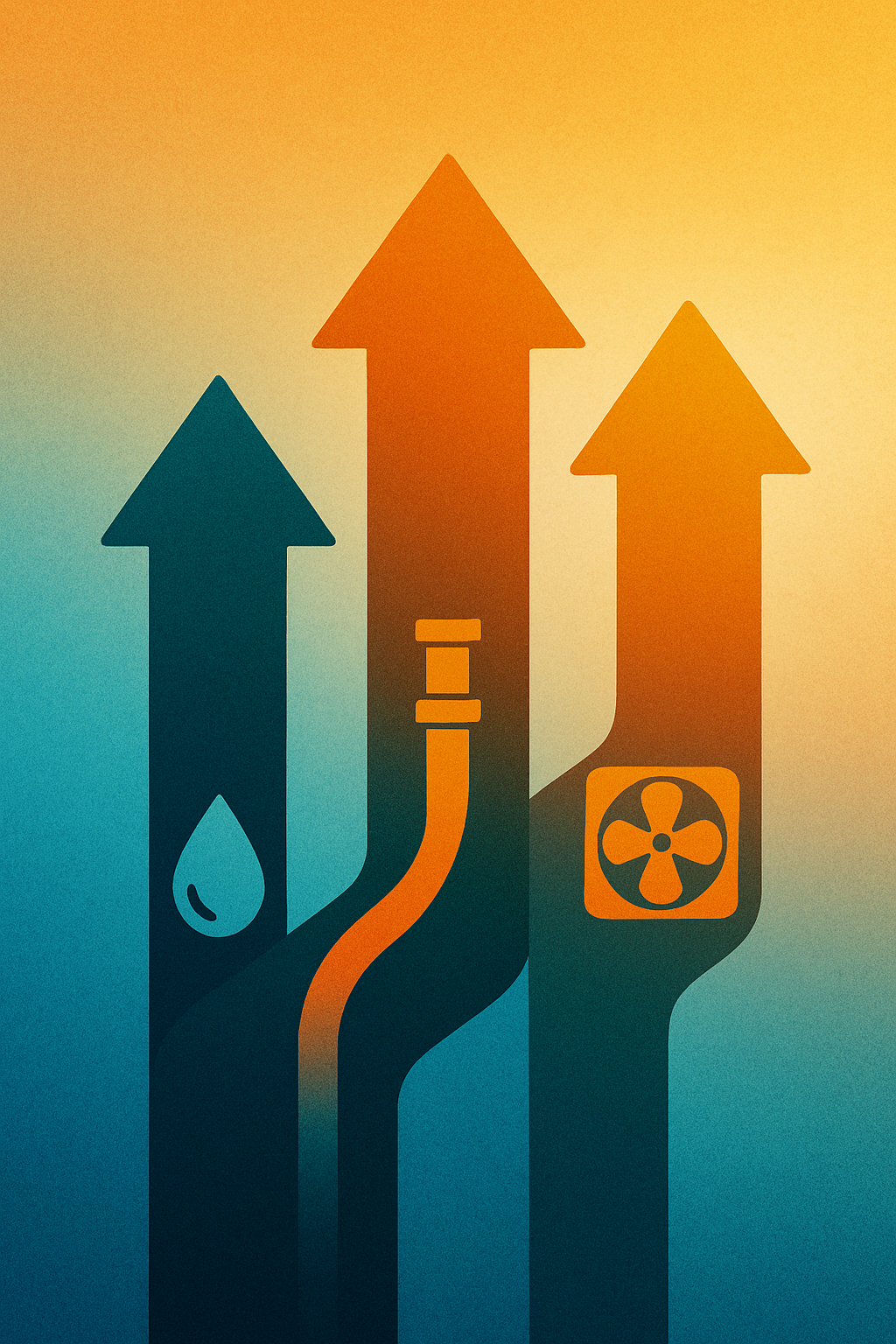The 6F Blog: HVAC/Plumbing Services
Welcome to the 6F Media Blog HVAC/Plumbing Services category articles home page.

Smarter Scheduling, Faster Jobs: How GPT Workflows Are Redefining HVAC & Plumbing Operations
Smarter Scheduling, Faster Jobs: How GPT Workflows Are Redefining HVAC & Plumbing Operations
Calls, dispatches, and service tickets pile up fast. Miss one, and the customer goes elsewhere. Most HVAC and plumbing businesses still rely on manual scheduling and handwritten notes—systems that can’t keep up with customer demand. GPT-powered automation is changing that, giving contractors real-time visibility, faster response times, and higher close rates without adding staff.
Turning Inbound Calls Into Booked Jobs
A Booking GPT can monitor web forms, Google Business messages, or Facebook inquiries and convert them into scheduled appointments instantly. Instead of waiting for office hours, customers receive confirmations within minutes—day or night.
Dispatch GPTs can analyze technician routes, job duration, and traffic data to optimize assignments. The result: fewer drive hours, faster service, and better coverage during emergencies. Managers spend less time juggling schedules and more time managing growth.
Automating Follow-Ups and Reviews
Once a job closes, a Review GPT can send follow-up texts and review requests automatically. It tracks responses and alerts staff if issues arise, keeping reputation management simple and proactive.
Keeping Technicians in Sync
Field GPTs can summarize daily work orders, surface notes from previous visits, and provide quick access to equipment histories. That means less downtime between calls and fewer mistakes caused by missing context.
Why It Matters
Speed wins in home services. When booking, dispatch, and follow-up happen automatically, customers feel cared for and employees stay focused on what matters—quality work. GPT workflows deliver that efficiency without sacrificing personal service.
Want to see how GPTs can help your HVAC or plumbing business handle more calls, faster?
Contact 6F Media or schedule a 15-minute AI feasibility call to explore our AI-Driven Marketing services.

How HVAC and Plumbing Companies Can Enter Q4 with Stronger Marketing Systems
The fourth quarter often brings unpredictable demand for HVAC and plumbing companies. Early cold snaps create sudden spikes, while other weeks slow down. The businesses that finish strong are the ones with marketing systems in place before the season turns. AI GPTs can help companies prepare now so they aren’t scrambling later.
Planning Campaigns in Advance
An Email GPT can create ready-to-send seasonal campaigns: “Get your furnace checked before the first freeze” or “Holiday plumbing check specials.” With drafts ready weeks ahead, companies can roll out promotions as soon as weather changes or demand softens.
Keeping Crews Booked During Gaps
A Social GPT can draft targeted posts around preventive maintenance, indoor air quality upgrades, or winter preparedness. These campaigns keep phones ringing during slower weeks, ensuring steady technician schedules.
Building Reputation at Year-End
The end of the year is a prime time to ask for reviews. A GPT workflow can draft polite, personalized requests that go out after jobs, building credibility that carries into the new year.
Preparing for 2026 Early
Q4 isn’t just about finishing the year. It’s also about setting up momentum for the next one. A Blog GPT can generate content calendars that stretch into January, keeping the company visible while competitors go quiet.
Why It Matters
The companies that thrive in Q4 are those that treat marketing as a system, not a scramble. With GPTs handling the heavy lifting, HVAC and plumbing firms can stay responsive, consistent, and ready for whatever the season brings.
Want to see how GPTs can help your service business finish the year stronger? Schedule a 15-Minute AI Feasibility Call.

How AI Helps HVAC and Plumbing Companies Keep Customers Coming Back
Most HVAC and plumbing companies focus their marketing on getting the phone to ring. But the real profit often comes from repeat customers like the homeowners and businesses who trust you enough to call every time something breaks. Building that loyalty takes consistent communication, which is hard to maintain when crews are busy in the field.
AI GPTs are stepping in to help service businesses stay connected after the job is done, turning one-time callers into long-term clients.
Smarter Follow-Ups After Service
An Email GPT can generate thank-you notes within minutes of completing a job. Beyond simple gratitude, the messages can include reminders to schedule future maintenance, links to support resources, or even seasonal checklists that provide extra value.
Turning Reviews Into Reputation
Positive reviews don’t just happen. A Social GPT can draft polite review requests that go out automatically after work is finished. With consistent follow-up, companies build stronger online reputations, making it easier for new customers to choose them.
Campaigns That Anticipate Customer Needs
HVAC and plumbing systems follow predictable cycles. A Blog GPT can create content like “Five Signs Your Heater Needs Attention Before Winter” or “How to Avoid Holiday Plumbing Emergencies.” These articles, paired with targeted campaigns, keep customers engaged before problems arise.
Building Membership Programs
Some service companies use maintenance agreements or membership programs to lock in loyalty. GPTs can draft promotional materials, onboarding documents, and renewal reminders, helping retain customers year after year.
Why Retention Matters
A booked summer is great, but a steady year-round pipeline is better. By keeping in touch consistently, HVAC and plumbing companies ensure that when the next problem arises, customers don’t Google around for someone else. They already know who to call.
Want to explore how GPTs can help your HVAC or plumbing company build stronger customer relationships? Contact 6F Media.

Filling the Calendar: How AI Powers Off-Season Campaigns for Service Businesses
Summer keeps HVAC and plumbing companies busy, but what about when demand cools off? A packed July schedule doesn’t guarantee steady work in September. The strongest companies use the busy months to prepare for the quieter ones, and AI GPTs make that process easier than ever.
Turning Summer Jobs Into Repeat Customers
Every repair or installation is a chance to book the next visit. An Email GPT can automatically draft thank-you messages with reminders: “Schedule your furnace tune-up before the first freeze.” These small touches convert one-time callers into loyal clients.
Targeted Promotions That Hit at the Right Time
A Social GPT can generate targeted campaigns around seasonal needs, such as pre-winter furnace checks, holiday plumbing prep, or “back-to-school comfort” specials for HVAC upgrades. Instead of scrambling to fill slow weeks, companies roll out steady promotions months in advance.
Keeping the Brand Visible Year-Round
A Blog GPT helps build authority with posts like “How to Spot Small Leaks Before They Become Big Repairs” or “Why Fall Is the Best Time to Service Your Heater.” These articles keep the website fresh, improve SEO, and remind customers who to call before problems arise.
Automating Review Requests
Positive reviews built during peak season fuel off-season trust. GPT-driven workflows can draft personalized review requests that go out after completed jobs, strengthening digital reputation when new customers are searching.
Why It Matters
The best companies don’t just survive the off-season. They plan for it while business is booming. With GPTs automating marketing and client follow-up, HVAC and plumbing businesses can keep technicians busy all year long.
Want to see how AI can help your service company stay booked beyond the summer rush? Contact 6F Media.

Summer Workloads and Smart Marketing: How AI Books More Jobs When Demand Peaks
When temperatures climb, HVAC and plumbing companies get busier than ever. The phones ring, schedules fill, and crews are out nonstop. But heavy demand also brings pressure like missed calls, forgotten follow-ups, or delayed responses can send customers straight to a competitor.
AI tools, especially purpose-built GPTs, give service businesses an edge during the summer rush. By automating outreach and tightening communication, you can capture more of those in-season jobs without burning out your team.
Staying Visible in Real Time
Homeowners often search “AC repair near me” or “emergency plumbing” the moment a problem hits. A Social GPT can push timely updates to Google Business Profile and Facebook, announcing availability, specials, or same-day service. This real-time visibility ensures your company shows up where customers are looking.
Smarter Job Booking
An Email GPT can handle the small but critical touches that close jobs:
- Confirmation emails after booking.
- Pre-appointment reminders that reduce no-shows.
- Follow-up offers like “Schedule your furnace tune-up now and save 10%.”
These touches run automatically, even when the office staff is overwhelmed.
Capturing Every Call and Lead
AI chat assistants on your website or landing pages can handle after-hours inquiries, answer FAQs, and even collect booking info. Instead of losing jobs overnight or on weekends, your business stays responsive 24/7.
Turning Summer Customers into Year-Round Clients
Summer is peak season, but the real win is converting one-time callers into repeat customers. GPT-powered campaigns can schedule fall tune-up reminders, draft thank-you emails, and request reviews after each completed job. That builds a steady pipeline long after the heat fades.
Why It Matters
The difference between a busy summer and a record-breaking one often comes down to response time. AI ensures no opportunity slips away, whether it’s a customer searching online, an inquiry after hours, or a booked job that needs nurturing into repeat business.
Want to see how AI can help your HVAC or plumbing company handle peak demand? Schedule a 15-Minute AI Feasibility Call.

How HVAC and Plumbing Companies Can Use AI GPTs to Keep Phones Ringing and Crews Busy
Running a HVAC and plumbing business is a constant balancing act. Calls need answering, jobs need scheduling, and reviews need managing, all while technicians are out in the field. Marketing often slips to the bottom of the list, even though it’s the engine that keeps new work coming in.
That’s where specialized GPTs step in. These AI tools can’t fix a furnace or unclog a drain, but they can handle the marketing and communication tasks that keep the pipeline full.
A Day in the Life with GPTs
7:30 a.m. – Daily Dispatch and Social Updates
While techs are loading trucks, a Social GPT pushes out fresh posts to Facebook and Google Business Profile: “Today’s tip for lowering your cooling bill,” or “Ask about our same-day water heater installs.” No more scrambling for content.
10:00 a.m. – Blog Drafts for the Website
A Blog GPT turns service tickets or FAQs into SEO-friendly blog posts like “How to Know If Your AC Needs a Recharge” or “5 Signs Your Pipes Need Repiping.” These posts help homeowners searching online find your company first.
1:00 p.m. – Customer Email Campaigns
An Email GPT sends out a seasonal reminder: “Book your fall furnace tune-up before the first freeze.” Campaigns like this bring back repeat business without a marketing coordinator.
5:00 p.m. – Review Requests
After jobs close, the GPT drafts personalized text or email requests for reviews. Positive reviews mean higher local rankings and more inbound calls.
Optional Add-Ons for Operations
- Doc Review GPT: Summarizes manufacturer manuals into easy training notes.
- Billing GPT: Drafts invoices from work orders before syncing into your accounting system.
- Documentation GPT: Creates quick reference sheets for new hires.
Why It Works
For HVAC and plumbing, marketing isn’t about flashy campaigns. It’s about staying visible, reminding customers at the right time, and keeping the schedule full. GPTs automate the routine touches so owners and techs can focus on the work itself.
Want to see how a GPT suite could keep your phones ringing? Schedule a 15-Minute AI Feasibility Call.